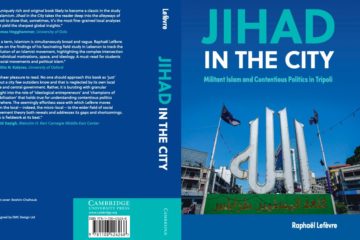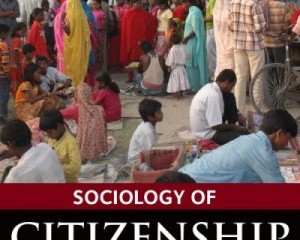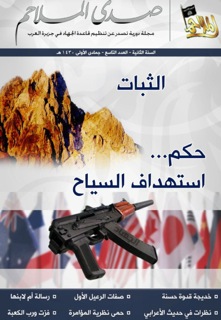A Home for the Nation and the World: 150 Years of the Abolition of the Universities Tests Act
June 16, 2021 marks the 150th anniversary of the Universities Tests Act 1871, which fully opened the universities of Oxford, Cambridge, and Durham to non-Anglicans, who were restricted from membership of England’s historic universities once the Test Act of 1673 came into force. Oxford had an even older restriction on non-Anglicans dating back to 1581. English dissenters played a significant role in encouraging the revocation of the Tests Act, since they believed that “Oxford and Cambridge were national institutions which ought to be open to all Englishmen, irrespective of their religious opinions” (Twaddle 1966). Even when the restriction was lifted, however, many English Catholic bishops discouraged Catholic youths from enrolling at Oxford and Cambridge “fearing the universities’ scepticism and Anglican …

Jihad in the City: Militant Islamism and Contentious Politics in Tripoli- Author’s Q&A
We interviewed Raphaël Lefèvre about his new book Jihad in the City: Militant Islamism and Contentious Politics in Tripoli, available now. OxPol: What motivated you write your book? Raphaël Lefèvre: I wanted to shed light on a little-known historical event with large contemporary echo: the creation by a militant Islamist movement of an “Islamic Emirate” on the city of Tripoli, Lebanon in 1982-1985. This movement has modern parallels with the “Islamic Caliphate” created by ISIS in parts of Iraq and Syria after 2014 and with similar attempts by Al-Qaeda to create “Islamic Emirates” on the territories it has sporadically controlled recently, from Southern Yemen and Northern Mali to Northern Syria. I am not suggesting that the 1982-1985 “Islamic Emirate” in Tripoli …

Towards the Eruvian Age: Public Space in a Pandemic
In 2013, as two Fellows at New York University, we embarked on an “eruv tour” of Manhattan. Created through almost invisible strings attached to poles that envelope part of the city, this imaginary enclosure serves to delineate a religious space in which it is permissible to carry out the Jewish Sabbath. Today, we contemplate this almost invisible boundary running down Sixth Avenue with new appreciation of the insights it may yet bring to our current predicament as a pandemic of unprecedented proportions forces us to reinvent our common space, the boundaries which define it and the ways we can and should interact within it. The eruv was introduced in Roman Palestine around 50AD for a Jewish community where many of …
Dissecting the Hindu Chauvinism in India’s COVID-19 Response
The global Covid-19 pandemic has led an alarming transformation of the world’s social, economic, and political life. In that context, it is important to understand how the pandemic has added momentum to India’s inertial slide into a full-fledged Hindu majoritarian state. In India, Prime Minister Narendra Modi’s Hindu nationalist government has seized upon this public health emergency as an opportunity to strengthen its hold on Indian society. In this article, we examine how the Covid-19 pandemic has provided Modi’s single-party national government with fertile ground for advancing its Hindu nationalist project. Vigilante Blame Culture The global spread of Covid-19 has provided Hindutva organisations, which seek to merge Hindu and Indian identities, with a fresh target for their nationalist propaganda. In line with …
The Ineffective International Response to the Rohingya Crisis ─ A Paradox
The longstanding Rohingya crisis in Myanmar has generated massive human rights violations, becoming a humanitarian disaster. It is not only an internal matter for Myanmar, as it has destabilized the regional tranquility of South and Southeast Asia and triggered a global outcry. In this article, I will illustrate why major states, such as China, India, Russia, and the US, have adopted a policy of overlooking the Rohingya crisis. I have intentionally excluded the potential for a prominent leadership role from the already fragile Muslim world because of both their general absence from the central world leadership and their preoccupation with their own domestic crises. The Rohingya are the largest community among eight prominent Muslim groups in Myanmar and have lived in its Rakhine State (formerly Arakan) for generations. They are envisaged by the nation’s government and Buddhist population as illegal Bengali immigrants who came from what is …

Between Nation-State and Ummah’s Appeal: The contradictions of Islamism in contemporary India and Bangladesh
Generally, Islamists believe in the Universalist concept of Ummah (Islamic community of believers), a supranational or transnational union. The Islamists’ call for unity of the Ummah is based on the belief that Muslims throughout the world should have a sense of solidarity among them cutting across the borders of the nation-state. In this respect, Islamism has justifications to oppose the concept of the nation-state. The Islamist ideologue Maududi (1993) was opposed to the idea of the nation-state, and citizenship based on nationality, considering nationalism to be divisive and as such incompatible with Islam (Maududi 1992).
Conceptually, ‘Ummah’ incorporates the Muslim community in the world as a whole. Therefore, Islamism always tries to claim itself as a ‘mass ideology’ instead of a ‘class one’. For a mass ideology, it asserts the unity of ‘Ummah’ where persons across class, national, linguistic and gender divides can become a part. As an effective tool of political mobilization, the universal concept of Ummah is absolutely crucial in Islamist political ideology. In Laclau’s (1996) terms, one can argue that in Islamist politics, Ummah acts as an ‘empty signifier’ around which different particularities are organized to claim a common universal identity. The idea of Ummah provides the ground for Islamists to take the challenge of rallying the entire Muslim community under a single political project, a project I call Islamist populism.

Netanyahu and the two-state solution
Israel’s international image has suffered tremendously in the past few years. Repeated wars in the Gaza Strip, the continued construction of housing units in Jerusalem and the West Bank, and Benjamin Netanyahu’s provocative rhetoric during his most recent bid to win re-election have poisoned the relationship between Israel and the international community. 2014 proved to be the year of Palestinian statehood recognition votes in Europe. Parliaments from Portugal to Ireland, all the way to the European Parliament in Brussels have considered recognition. Though cautiously worded, the motions indicate a change in the international mood surrounding the Middle East conflict. Netanyahu’s most recent declarations of support for the two-state solution reflect the deep concern that has spread in Israel regarding what is for the first time serious international pressure on the country. But does this necessarily translate into a bright future for the Peace Process?
Netanyahu’s interest in a two-state as opposed to a one-state solution should not take us by surprise. The latter would mean an Arab majority in the would-be Jewish state. At this time, about six million Jews and six million Arabs inhabit the territories of Israel and the future Palestinian state. With a higher Arab fertility rate, Jews would soon be a minority in such a state. Moreover, Palestinians seek the right of return of their over five million refugees as part of the state-creating deal, and it is to be expected that the state would attract a greater number of Palestinian refugees than of Jews eligible to return to Israel. It follows that a one-state solution spells the unthinkable for Israel.

Oxford’s Elisabeth Kendall on Jihadism and the use of poetry
What is it that turns peace-loving Muslims into militant Islamists? There are many answers to this complex question. One angle that might not naturally spring to mind is poetry. Yet this is what Dr Elisabeth Kendall argues in an interview for BBC Radio 4’s “The World This Weekend” with Mark Mardell.









